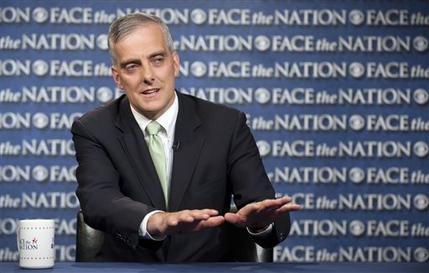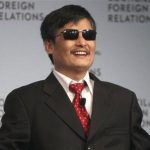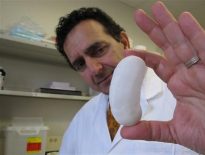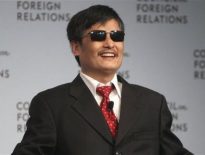WASHINGTON (AP) — Top officials from the Obama and Bush administrations say the government’s newly exposed secret surveillance programs have been essential to disrupting terrorist plots and have not infringed on Americans’ civil liberties.

The officials justify the massive trawling for phone and Internet data as new revelations add to public disclosures about the classified operations.
Denis McDonough, President Barack Obama’s chief of staff, said the executive, legislative and judicial branches of government, using “aggressive internal checks inside the administration, from inspectors general and routine audits, are overseeing how we do these programs.”
McDonough, appearing on CBS’ “Face the Nation,” added, “The American people can feel confident that we have those three branches looking.”
Officials from the George W. Bush administration, including former Vice President Dick Cheney and former CIA and National Security Agency head Michael Hayden, were among those who appeared on Sunday talk shows to back the government’s reliance on data collection from Americans and foreign nationals. Like McDonough, they said the operations are constitutional and carefully scrutinized by authorities for any signs of abuse.
The latest reassurances came as a Washington Post report on Sunday described the massive structure of four major data collection programs that have been set up by the government since the terrorist attacks of Sept. 11, 2011. The Post report follows earlier stories based on documents provided by NSA contractor Edward Snowden.
Two secret programs, the Post reported in its new disclosures, are aimed at phone and Internet metadata, while two more target contents of phone and Internet communications.
Metadata includes logs and timing of phone calls and lists of Internet communications, but does not include the actual contents of communications. Even without knowing those contents, intelligence officials can learn much from metadata, including likely locations and patterns of behavior.
A previously reported surveillance program aimed at the phone logs and location information of millions of Americans is called Mainway, the Post reported. A second program targeting the Internet contact logs and location information of foreign users is called Marina.
A third program, which intercepts telephone calls and routes their contents to government listeners, is called Nucleon.
A fourth program, Prism, exposed recently by Snowden, forces major Internet firms to turn over the detailed contents of Internet communications. Prism is aimed at foreign users but sometimes also sweeps up the content of Americans’ emails and other Internet communications, officials have acknowledged.
“The metadata story does touch upon Americans in a massive way with phone records but not the content. The Prism story is about foreigners and it is about content,” Hayden told NBC’s “Meet the Press.”
Rep. Mike Rogers, who heads the House Intelligence Committee, said any phone metadata from Americans swept up in the surveillance is held under careful safeguards, kept in a “lockbox” that can only be accessed if it becomes relevant to terror investigations. U.S. officials also said Saturday that gathered data is destroyed every five years.
“This is a lockbox with only phone numbers, no names, no addresses in it, we’ve used it sparingly,” Rogers, R-Mich., said on CNN’s “State of the Union.”
But one congressional critic of the secrecy surrounding the government’s surveillance raised doubts about the effectiveness about the widespread collection of Americans’ phone metadata.
“I don’t think collecting millions and millions of Americans’ phone calls – now this is the metadata, this is the time, place, to whom you direct the calls – is making us any safer,” said Sen. Mark Udall, D-Colo. Udall said he would introduce a bill this week to narrow the reach of that collection to only “those who have a link to terrorism.”
Hayden said he worried that news reports about the programs have often provided erroneous information, “much to the harm of a rational national debate.” He did not specify those concerns.
The disclosures, provided in recent days by both the Post and The Guardian newspaper, came from classified documents exposed by Snowden, 29, who was working as a private contractor with the NSA and later said he grew disenchanted by what he saw as a growing secret American surveillance apparatus. After working with the two newspapers, Snowden turned up in Hong Kong, prompting concern that he might cooperate with Chinese authorities.
“I am very, very worried that he still has additional information that he hasn’t released yet, the Chinese would welcome the opportunity and probably be willing to provide immunity for him or sanctuary for him, if you will, in exchange for what he presumably knows,” Cheney said on “Fox News Sunday.”
Cheney added that he has “trouble believing” Snowden had access to all the materials he has disclosed, suggesting the possibility that Snowden had an accomplice inside U.S. security circles.
“I think you have to ask that question,” Cheney said.
McDonough declined to speculate on Snowden’s dealings with China or his access to secret documents, citing a law enforcement investigation. But he cautioned against “some of the hyperbole that now is being thrown around from him and from others involved in this debate that would somehow cast a pall on the intelligence community.”
But McDonough disputed Snowden’s claim that he had the ability to listen in on any phone conversation, including the president’s.
“That’s incorrect,” McDonough said.





